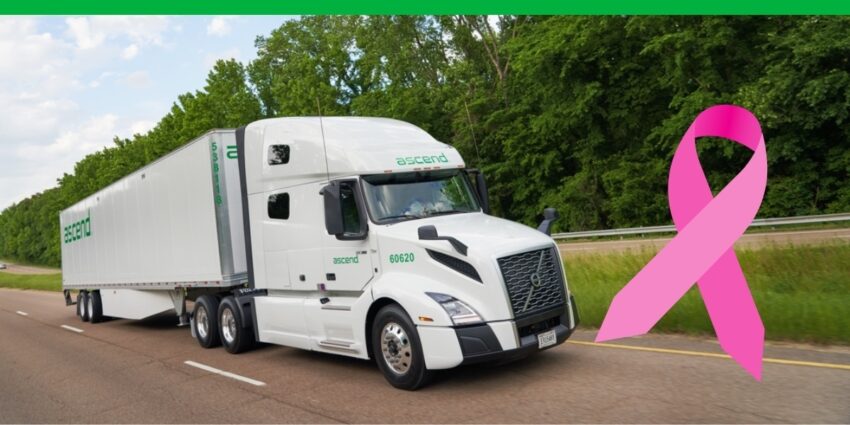
Cancer prevention tips, treatment support coverage from Ascend
Post Date - Oct 4, 2022
No one likes to think about the Big C, but cancer can affect people of all ages and from all walks of life and backgrounds. Ascend is committed to offering our drivers and staff health preventative care benefits to help keep cancer at bay when possible and offer support during treatment. Here are some tips for reducing cancer risk and information on managing cancer treatment.
Cancer prevention and risk reduction
First, Ascend encourages everyone to learn and take some simple steps to reduce their cancer risk. At the top of the list are Preventative screenings. Most of us know that cancer is highly treatable when detected early, even before symptoms appear. Early detection generally finds cancer while it is still "local" and contained to one organ or part of the body. Preventative cancer screenings are the key to detecting cancer at its most treatable stage before it spreads to other areas of the body and becomes more challenging to cure or manage.
You'll need to discuss your individual risk factors with your doctor to see if there are particular preventative cancer screenings you should focus on, but recommended cancer screenings include:
· Breast cancer screening (mammography)
· Cervical cancer screening (Pap tests and other gynecological exams)
· Colorectal cancer screening
· Prostate cancer screening (prostate-specific antigen (PSA) test)
· Lung cancer screening (low-dose CT scan)
Move your body, eat better
Take a look at your lifestyle choices. While it is true that some cancers can be hereditary, most are not linked to the genes we inherit - meaning we can cut the risk of cancer through positive lifestyle changes.
According to the Centers for Disease Control (CDC), being overweight (having a body mass index of 25 to 29) or obese (body mass index of 30 or more) increases the risk of certain cancers, including uterine, breast, pancreatic, and colorectal.
Decrease your cancer risk by eating healthier foods and moving your body. We know! It's tough for professional truck drivers to find healthy food options on the road and a place to exercise, but with a little effort, you can do it!
Try to incorporate periods of walking when you can - when refueling, loading, or during rest periods. Even if it's only 20 minutes, that cardiovascular activity can boost your health!
You may also want to consider doing an in-cab workout with resistance bands or signing up for a nationwide gym to join, where you can work out wherever you are. Any added exercise will help.
As for eating better, consider prepping meals home with fresh veggies and fruits rather than eating out. However, if you do need to eat out on the road, here are some options for lighter choices.
Use sunscreen
Skin cancer is the most common type of cancer in the U.S., with 1 in 5 Americans developing skin cancer in their lifetime. As a professional truck driver, you get a lot of sun exposure every day, especially on the left side of your face and body. Although glass does filter out harmful UVB rays, it cannot filter out UVA rays which can penetrate deeper into the skin. Fortunately, skin cancer is one of the most preventable forms of the disease. Always protect your skin from the sun by using sunscreen with a sun protection factor (SPF) of at least 15. Use a shade and wear clothing like a hat or long sleeves to block the sun when possible. Remember to also check your skin regularly for any changes or new moles and report them to your doctor.
Stop smoking
You know this one, but that doesn't mean it's easy to do! If you're not a current tobacco user, don't start! Smoking is closely linked to at least 10 cancers, including lung, mouth, throat, larynx, pancreatic, and bladder cancer. Lung cancer is the leading cause of cancer death for both men and women, so it's crucial to eliminate tobacco use - including e-cigarettes - from your life. Even if you already have a smoking-related illness, quitting will benefit your health. Enroll in a smoking cessation program or talk to your doctor about tools to help you quit.
Cancer support
If you do find yourself facing cancer, Ascend provides cancer support services through our health benefits program that includes nurse care managers, emotional support, and digital tools to help patients cope. Through our program, we can help you set treatment goals, find relief from pain and other symptoms, and access support services like palliative care and hospice without having to make difficult treatment decisions or stop treatment. If you've ever had family or friends diagnosed with cancer, it's likely you know you're all part of the patient's cancer journey. Ascend connects caregivers to support resources like Help for Cancer Caregivers or Stronger Together. We hope these benefits can help lessen the anxiety, fear, and financial hardship following a cancer diagnosis.
Ascend wants everyone to live a long, healthy, fulfilling life and offers benefits and programs to our drivers and staff to support that in any way we can. If you're interested in hearing more about the benefits we offer drivers at Ascend, connect with us today.
Sources: